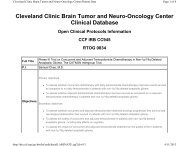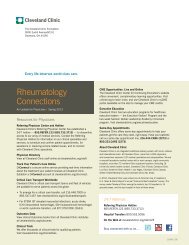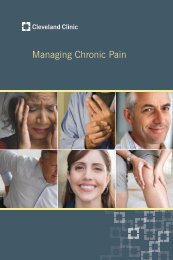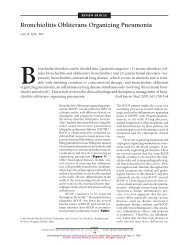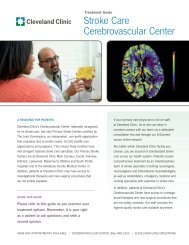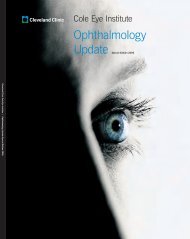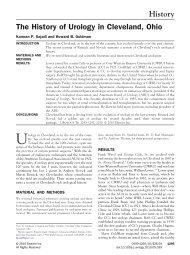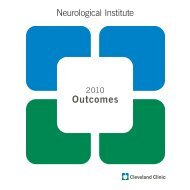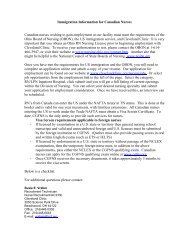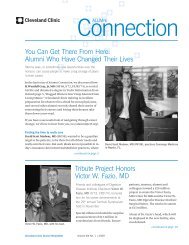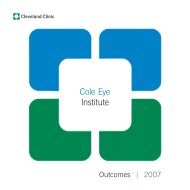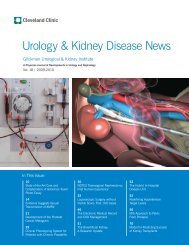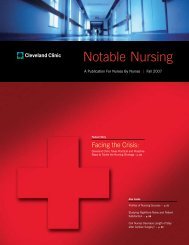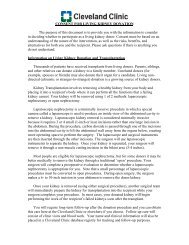Geriatric Times - Cleveland Clinic - Cleveland Clinic Home
Geriatric Times - Cleveland Clinic - Cleveland Clinic Home
Geriatric Times - Cleveland Clinic - Cleveland Clinic Home
You also want an ePaper? Increase the reach of your titles
YUMPU automatically turns print PDFs into web optimized ePapers that Google loves.
Sleep Disorders in the <strong>Geriatric</strong> Patient<br />
Require Careful Diagnosis and Treatment<br />
Charles Bae, MD, Sleep Disorders Center<br />
Misconceptions about sleep and the<br />
elderly are one reason that sleep disorders<br />
often go undocumented and untreated in<br />
this population. Many studies have demonstrated<br />
that sleep disorders, not aging<br />
itself, are the cause of decreased sleep in<br />
geriatric patients.<br />
Patterns of sleep do undergo change as<br />
a result of aging. The relative amount<br />
of rapid eye movement (REM) sleep<br />
remains unchanged until extreme old age.<br />
However, the duration of stage one and<br />
two light, non-REM sleep increases with<br />
age, while the percentage of stage three and<br />
four deep, non-REM sleep decreases with<br />
age. In patients in their 90s, stages three<br />
and four may be completely absent.<br />
Sleep disorders that occur relatively<br />
frequently among older patients include<br />
sleep apnea, restless leg syndrome and circadian<br />
rhythm changes. These are distinct<br />
from true insomnia, a condition in which<br />
the individual has difficulty falling asleep<br />
due to worry or anxiety. Beyond these disorders,<br />
interrupted sleep in geriatric patients<br />
also may be traced to independent factors<br />
that include pain, dementia, medication or<br />
medication interactions.<br />
Although sleep apnea may cause choking,<br />
snoring, restless sleep or nighttime<br />
wakening, the affected individual may<br />
be unaware of the problem. Restless leg<br />
syndrome also causes interrupted sleep.<br />
Circadian rhythm changes, in contrast,<br />
are more likely to result in either diffi-<br />
culty falling asleep or waking up too early<br />
without feeling rested.<br />
Each of these problems has a unique<br />
pathophysiology, underscoring the<br />
importance of the primary care physician<br />
obtaining a complete history from the<br />
patient that includes specific inquiries<br />
about sleep habits as the first step in<br />
diagnosing and treating a sleep disorder.<br />
Complaints about depression, fatigue or<br />
memory issues should be red flags to the<br />
physician that quantity or quality of sleep<br />
may be inadequate.<br />
Reports of difficulty falling asleep,<br />
staying asleep or interrupted sleep may<br />
be a reason to refer the patient for a<br />
comprehensive sleep evaluation, a polysomnogram.<br />
This overnight test records<br />
physiologic data during various stages of<br />
sleep and wakefulness, including body<br />
position, brain waves, eye movement,<br />
blood oxygen saturation levels, respiration,<br />
muscle tone and heart rate, as well as<br />
snoring and general sleep behavior. Data<br />
from the study allow a sleep specialist to<br />
diagnosis problems such as sleep apnea<br />
and restless leg syndrome, or to identify<br />
non-medical causes of sleep disturbance<br />
such as sleep hygiene or body position.<br />
Determining the etiology of the sleep disorder<br />
is essential for planning appropriate<br />
treatment. Depending on the underlying<br />
cause, some sleep disturbances can be<br />
corrected by changes in sleep hygiene,<br />
exposure to light, behavioral techniques<br />
or relaxation.<br />
clevelandclinic.org/geriatrics<br />
Sleep disorders are a common but underdiagnosed problem in the geriatric patient population. Sleep deprivation in geriatric<br />
patients often is associated with short-term memory loss, depression and decreased cognition, which can contribute to a<br />
misdiagnosis of dementia or other cognitive impairment. It also is associated with an increased risk of falls, an important cause<br />
of morbidity and mortality in the elderly.<br />
Medication is effective in treating some<br />
sleep disorders, including restless leg<br />
syndrome, but should be used sparingly<br />
in geriatric patients. Benzodiazepine<br />
receptor agonists, the newest class of<br />
prescription sleep medications, have fewer<br />
side effects than older types, but still pose<br />
certain risks in the elderly. These include<br />
an increased risk of daytime falls, confusion<br />
and forgetfulness the next day, and<br />
drug interactions.<br />
Sleep medication use in the geriatric<br />
patient requires careful monitoring to<br />
avoid development of dependence or tolerance.<br />
Ideally, these medications should<br />
be used on a short-term basis only or, if<br />
required for an extended period of time, on<br />
an as-needed basis rather than daily, and<br />
always under the supervision of a physician.<br />
Elderly patients may require lower<br />
doses, and potential drug interactions must<br />
be evaluated in advance of prescribing.<br />
As a general rule, referral to a sleep specialist<br />
for diagnosis and treatment may be<br />
appropriate when sleep disturbances lead<br />
to impaired functioning the next day, over<br />
an extended period of time. ■<br />
Dr. Bae sees patients<br />
at main campus<br />
and the Willoughby<br />
Hills Family Health<br />
Center. Physicians<br />
may contact him at<br />
216.444.3323, or by<br />
email at baec@ccf.org.<br />
19



